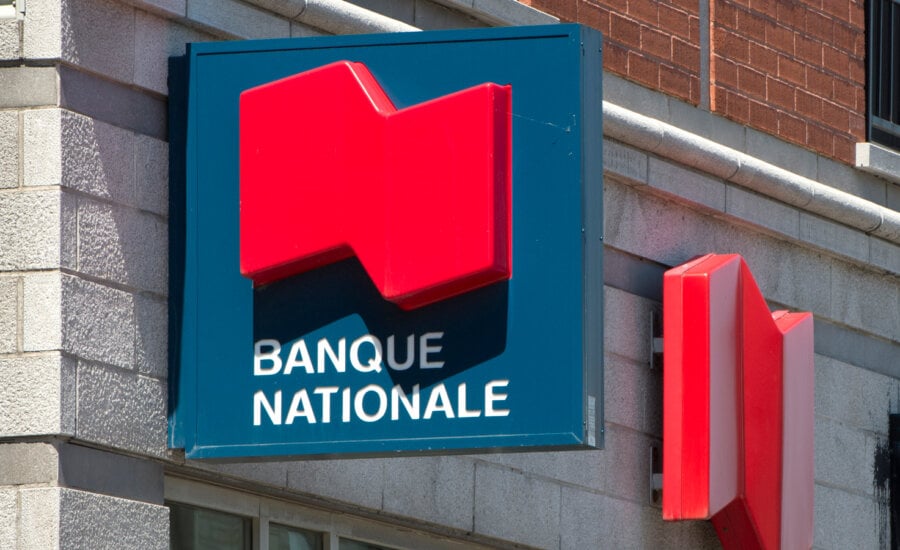Canadian bank earnings reports
Canada’s Big Six banks are releasing their quarterly earnings. Here’s what they said this week.
Advertisement
Canada’s Big Six banks are releasing their quarterly earnings. Here’s what they said this week.

The Big Six banks in Canada reported on their earnings this week. Here are the takeaways, including revenue, prices and dividends.
Here’s how Canadian banks performed in the three months ending October 31st, 2024:
BMO Financial Group (BMO/TSX) significantly missed analyst earnings expectations as the money it set aside for potential loan losses jumped. The bank reported on Thursday a fourth-quarter profit of $2.30 billion, up from last year thanks to a $1.18 billion pre-tax boost from the reversal of a legal judgment related to a Ponzi scheme in the United States. Adjusted earnings that excluded the one-time gain showed a net income of $1.54 billion, down from $2.24 billion in the same quarter last year.
The earnings drop came as its provisions for credit losses surged to $1.52 billion from $446 million a year earlier.
“Our overall results were impacted by elevated provisions for credit losses,” said BMO chief executive Darryl White in a statement. “We expect quarterly provisions to moderate through 2025 as the business environment improves.”
BMO shares were trading 4% lower at $128.74 on the Toronto Stock Exchange early Thursday morning.
The headline provision number includes $1.11 billion set aside for the more serious impaired category where it’s even less confident it will have the loans paid back. The shaky loans helped lead to adjusted earnings of $1.90 per diluted share in its latest quarter, down from an adjusted profit of $2.93 per diluted share a year ago. The average analyst estimate had been for an adjusted profit of $2.41 per share, according to data provided by LSEG Data & Analytics.
Revenue totalled $8.96 billion, up from $8.32 billion in the same quarter last year.
The bank said Thursday it will now pay a quarterly dividend of $1.59 per share, up from $1.55 per share.
BMO said its Canadian personal and commercial banking business earned $750 million in its latest quarter, down from a profit of $922 million in the same quarter last year. In the U.S., the bank said its personal and commercial banking operations earned $256 million, down from a profit of $591 million a year earlier.
BMO’s wealth management business earned $326 million, down from a profit of $351 million a year ago, while its capital markets business earned $251 million, down from a profit of $472 million in the same quarter last year. The bank’s corporate services segment reported a profit of $721 million, compared with a loss of $626 million a year ago, as it reversed a 2022 provision related to a lawsuit associated with Marshall and Ilsley Bank, which BMO bought in 2011.

Earn 2.25% when you open a High Interest eSavings account.

Earn a guaranteed 3.50% in your TFSA when you lock in for 1 year.

Open your TFSA with one of the best online brokers in Canada. See our ranking.
MoneySense is an award-winning magazine, helping Canadians navigate money matters since 1999. Our editorial team of trained journalists works closely with leading personal finance experts in Canada. To help you find the best financial products, we compare the offerings from over 12 major institutions, including banks, credit unions and card issuers. Learn more about our advertising and trusted partners.
The Canadian Imperial Bank of Commerce (CM/TSX) raised its quarterly dividend as it reported a fourth-quarter profit of $1.88 billion, up from $1.49 billion in the same quarter last year. CIBC said Thursday it will now pay a quarterly dividend of $0.97 per share, up from $0.90. The increase in the payment came as the bank says it earned $1.90 per diluted share for the quarter ended Oct. 31, up from a profit of $1.53 per diluted share a year ago.
Revenue for the quarter totalled $6.62 billion, up from $5.85 billion in the same quarter last year, while CIBC’s provision for credit losses amounted to $419 million, down from $541 million a year earlier. On an adjusted basis, CIBC said it earned $1.91 per diluted share in its latest quarter, up from an adjusted profit of $1.57 per diluted share a year ago. The average analyst estimate had been for an adjusted profit of $1.79 per share, according to data provided by LSEG Data & Analytics.
“Our bank delivered record financial performance in 2024 through the consistent execution of our client-focused strategy across business lines and across borders, driving growth for our bank through client relationships and delivering value for all of our stakeholders,” CIBC chief executive Victor Dodig said in a statement.
CIBC said its Canadian personal and business banking business earned $743 million, up from a profit of $637 million in the same quarter last year, while its Canadian commercial banking and wealth management operations earned $516 million, up from a profit of $490 million a year earlier.
The bank’s U.S. commercial banking and wealth management business earned $202 million, up from a profit of $50 million a year ago. CIBC’s capital market and direct financial services operations earned $428 million, up from a profit $383 million in the same quarter last year. The bank’s “corporate and other” segment reported a net loss of $7 million for the fourth quarter compared with a net loss of $75 million a year earlier.
National Bank of Canada (NA /TSX) raised its dividend as it reported its fourth-quarter profit rose compared with a year ago.
The Montreal-based bank said Wednesday it will now pay a quarterly dividend of $1.14 per share, up from $1.10 per share. And National Bank says it earned $955 million or $2.66 per diluted share for the quarter ended Oct. 31, up from a profit of $751 million or $2.09 per diluted share in the same quarter last year.
Revenue for the quarter totalled $2.94 billion, up from $2.56 billion a year earlier, while the bank’s provision for credit losses amounted to $162 million, up from $115 million a year ago.
On an adjusted basis, National Bank says it earned $2.58 per diluted share in its latest quarter, up from an adjusted profit of $2.39 per diluted share in the same quarter last year. The average analyst estimate had been for an adjusted profit of $2.57 per share, according to data provided by LSEG Data & Analytics.
“Through disciplined execution, strong organic growth and resilient credit performance, we met all of our medium-term financial objectives in 2024,” National Bank chief executive Laurent Ferreira said in a statement. “Looking ahead to 2025 in what will remain a complex environment, we will continue to leverage our diversified business model and disciplined approach to credit, capital and costs as we pursue our growth path.”
National Bank said its personal and commercial banking business earned $327 million, up from $271 million in the same quarter last year, while its wealth management business earned $219 million, up from $155 million a year ago. The bank’s financial markets business earned $306 million, up from $284 million a year earlier.
National Bank’s U.S. specialty finance and international business, which mainly comprises its Credigy Ltd. and Advanced Bank of Asia Ltd. subsidiaries, earned $157 million, up from $145 million in the same quarter last year. The bank’s “other” segment reported a loss of $54 million in its latest quarter compared with a loss of $104 million a year earlier.
Royal Bank of Canada (RY/TSX) raised its dividend as it reported a fourth-quarter profit of $4.22 billion, up from $3.94 billion in the same quarter last year. The bank said Wednesday it will now pay a quarterly dividend of $1.48 per share, up from $1.42 per share. The increased payment to shareholders came as RBC says it earned $2.91 per diluted share for the quarter ended Oct. 31, up from a profit of $2.76 per diluted share in the same quarter last year.
Revenue totalled $15.07 billion, up from $12.69 billion a year ago, while its provision for credit losses amounted to $840 million, up from $720 million in the same quarter last year. On an adjusted basis, RBC says it earned $3.07 per diluted share in its latest quarter, up from an adjusted profit of $2.65 per diluted share a year earlier. The average analyst estimate had been for an adjusted profit of $3.01 per share, according to data provided by LSEG Data & Analytics.
“As our results exemplify, our premium franchises delivered diversified revenue growth, underpinned by a strong balance sheet and prudent risk management,” RBC chief executive Dave McKay said in a statement. “One of our year’s defining moments was the acquisition of HSBC Bank Canada, which marked a pivotal milestone in our client-driven growth story and strengthened our position as a competitive global financial institution.”
RBC said its personal banking business earned $1.58 billion, up from $1.37 billion a year earlier, helped by the inclusion of HSBC Canada results.
Meanwhile, the bank’s commercial banking operations earned $774 million, up from $668 million, also helped by the addition of HSBC Canada. RBC’s wealth management business earned $969 million, up from $272 million, while its insurance operations earned $162 million, up from $97 million a year ago. The bank’s capital markets business earned $985 million for the quarter, down from $987 million a year ago.
RBC’s corporate segment reported a loss of $247 million primarily due to the after-tax impact of the HSBC Canada transaction and integration costs compared with profit of $549 million for the segment a year ago.
Scotiabank (BNS /TSX) says it expects to see continued loan growth pressure and political uncertainty in the months ahead as it reported profits that were up from a year ago but below analyst expectations. The bank kicked off year-end results for the sector on Tuesday as it reported a fourth-quarter profit of $1.69 billion, up from $1.35 billion in the same period last year, as it set aside a smaller amount for bad loans compared with a year ago.
Profits were hit by taxes and a write-down of its holding in a Chinese bank, while its Canadian operations were affected by the softening economy, said chief executive Scott Thomson.
“The realities of a slowing economy and the impact of peak interest rates made for a challenging operating environment,” he said on a conference call with analysts. For the year as a whole, earnings grew “marginally” on modest loan growth, said Thomson, but that he expects the market to improve in the latter half of next year as interest rates continue to fall. “We anticipate additional easing through the first half of the year, which we expect will be stimulative to activity in the domestic housing and mortgage markets and buoy consumer and business confidence,” Thomson said.
Fears of a rise in mortgage defaults has led all banks to set aside provisions for potentially bad loans, but a 1.25 percentage point drop in the Bank of Canada rate is already easing some fears. Scotiabank set aside $1.03 billion in its fourth quarter, down from $1.26 billion a year ago, as it moved some loans of less concern out of the provisions entirely as borrower trends improved.
Fixed-rate mortgage customers were holding 6% more in their deposit accounts in the quarter from the previous one, while 90-day delinquencies were down from the last quarter.
“We’re starting to see some green shoots as it relates to interest rates starting to come through,” said chief risk officer Phil Thomas.
But the overall drop in provisions did include a rise in the more serious category of impaired provisions, the kind the bank thinks it might not get paid back. For Canadian banking, impaired provisions rose to $461 million, up from $286 million last year.
A substantial part of the increase in provisions came from about 250 customers, primarily in Toronto and Vancouver, though many borrowers are feeling pressure, said Thomas. “I think across our retail book in Canada, we’re definitely seeing some impact of higher for longer.”
The effects of higher rates helped lead to a thin 1% rise in mortgage and personal loans this quarter from a year earlier in Canada, while credit card loans were up 12%.
Revenue for the quarter totalled $8.53 billion, up from $8.27 billion in the bank’s fourth quarter last year. Profits amounted to $1.22 per diluted share for the quarter ended Oct. 31, up from $0.99 in the same quarter a year ago.
Earnings rose even as the quarter saw Scotiabank take a $343 million charge related to its write-down of its investment in Bank of Xi’an Co. Ltd. in China related to the country’s weakened economy. It also took a $38 million severance provision for laid-off staff.
On an adjusted basis, Scotiabank says it earned $1.57 per diluted share in its latest quarter, up from an adjusted profit of $1.23 per diluted share a year ago. The average analyst estimate had been for an adjusted profit of $1.60 per share, according to data provided by LSEG Data & Analytics.
Jeffries analyst John Aiken said the miss was largely from a higher-than-anticipated effective tax rate, while the bank also saw revenue headwinds and mixed performance on efficiency. “While a higher tax rate weighed, Scotia had a solid performance, as top line growth held steady, costs were contained, and provisions were better than expected,” Aiken said.
The bank is the first of the Big Six to report its fourth-quarter results this week. Royal Bank of Canada and National Bank of Canada report Wednesday, while Toronto-Dominion Bank, BMO Financial Group and CIBC report Thursday morning.
Aiken said it’s difficult to see a clear read-through on Scotiabank’s earnings to the other banks given its mixed results, including the mixed picture on provisions, higher trading revenue but weaker advisory activity, mixed margins and weaker loan growth.
There could also be a mixed picture ahead given all the political change underway.
Thomson said that new governments, such as those in the U.S. and Mexico where Scotiabank is working to expand, bring uncertainty on trade policy and relations, but that he’s optimistic on the outcome.
“We believe policy will ultimately support a co-operative environment that encourages capital investment and continued regional growth.”
TD Bank Group (TD/TSX) reported a rise in fourth-quarter profits after selling part of its Charles Schwab Corp. holdings, while its adjusted earnings dropped as it continued to grapple with the fallout from its anti-money laundering deficiencies. The bank reported a profit of $3.64 billion, up from $2.87 billion in the same quarter last year, boosted by a $1.02-billion gain from the Schwab share sales.
Adjusted earnings were down 8% to $3.2 billion in what chief executive Bharat Masrani called a challenging quarter. “A key development this quarter was the resolution of our U.S. AML matters, bringing important clarity to our stakeholders,” stated Masrani, who announced in the quarter that he would be retiring next April.
The bank said it will be challenging for it to generate earnings growth in the year ahead as it navigates a transition year, including all it needs to do to get its anti-money laundering systems up to standards.
As a result, it suspended its medium-term financial targets including earnings per share growth, return on equity and positive operating leverage and planned to provide updated targets in the second half of 2025.
“Our AML remediation is our top priority, and we remain focused on strengthening our risk and controls to meet our obligations,” said chief operating officer Raymond Chun, who is set to replace Masrani as CEO. “I’m confident that in the year ahead, we will refresh our strategy, drive change, and enhance efficient execution to deliver for our shareholders and all stakeholders.”
The bank’s fourth-quarter profit amounted to $1.97 per diluted share for the quarter that ended Oct. 31, up from $1.48 per diluted share a year earlier. TD said it sold 40.5 million Schwab shares in August when it also announced it would take a provision related to U.S. investigations into its anti-money laundering program. The bank agreed in October to pay fines totalling more than $4.23 billion after pleading guilty to multiple charges related to its failings.
On an adjusted basis, TD says it earned $1.72 per diluted share in its latest quarter, down from an adjusted profit of $1.82 per diluted share a year earlier. Analysts on average had expected an adjusted profit of $1.82 per share, according to data provided by LSEG Data & Analytics.
Revenue for the quarter totalled $15.51 billion, up from $13.18 billion in the same quarter last year, while TD’s provision for credit losses for the quarter totalled $1.11 billion, up from $878 million in its fourth quarter last year.

Scotiabank Passport™ Visa Infinite Card

SimplyCash Preferred Card from American Express

MBNA True Line Mastercard credit card
Share this article Share on Facebook Share on Twitter Share on Linkedin Share on Reddit Share on Email
These bank profits are a disgrace when so many people Are finding it difficult to put food on the table.